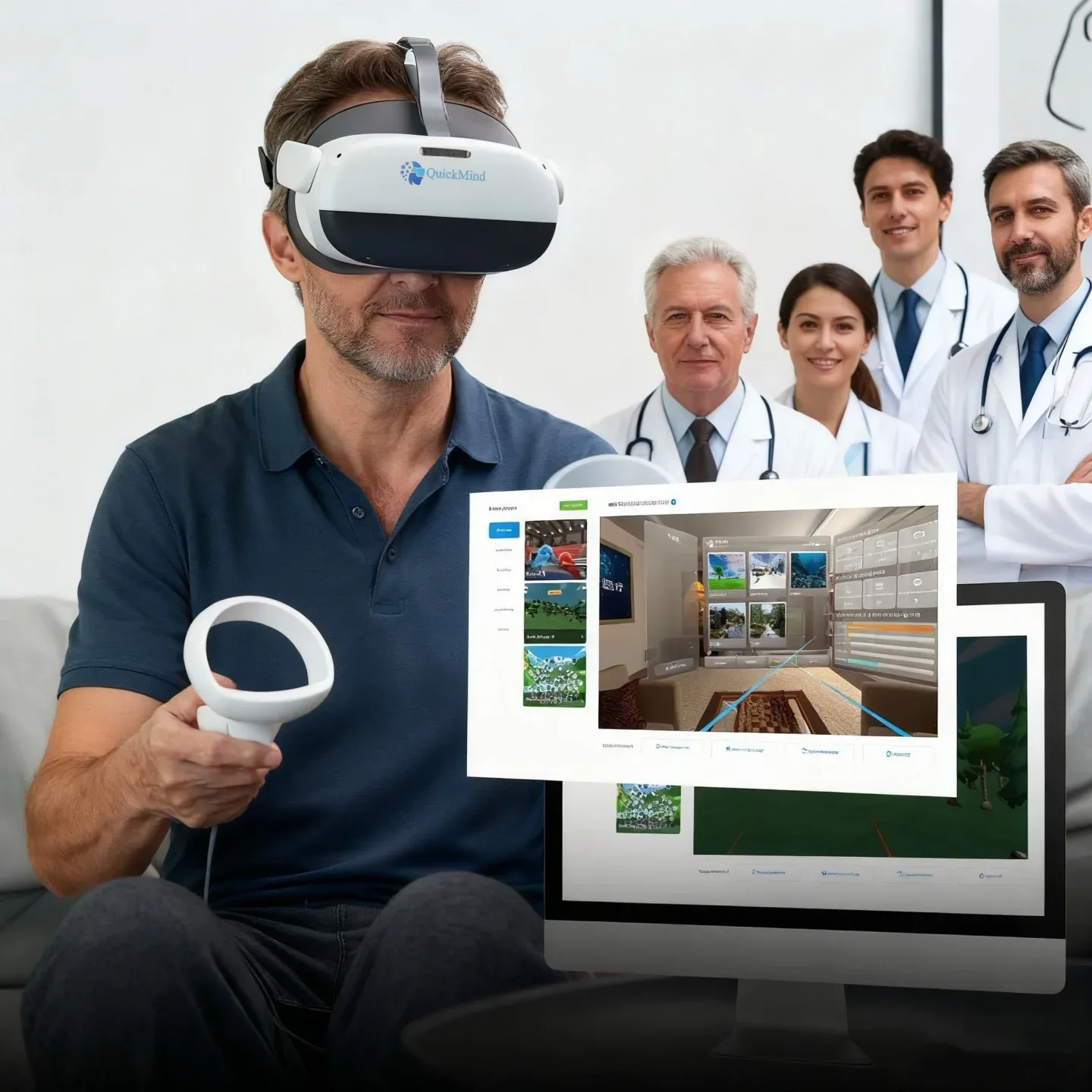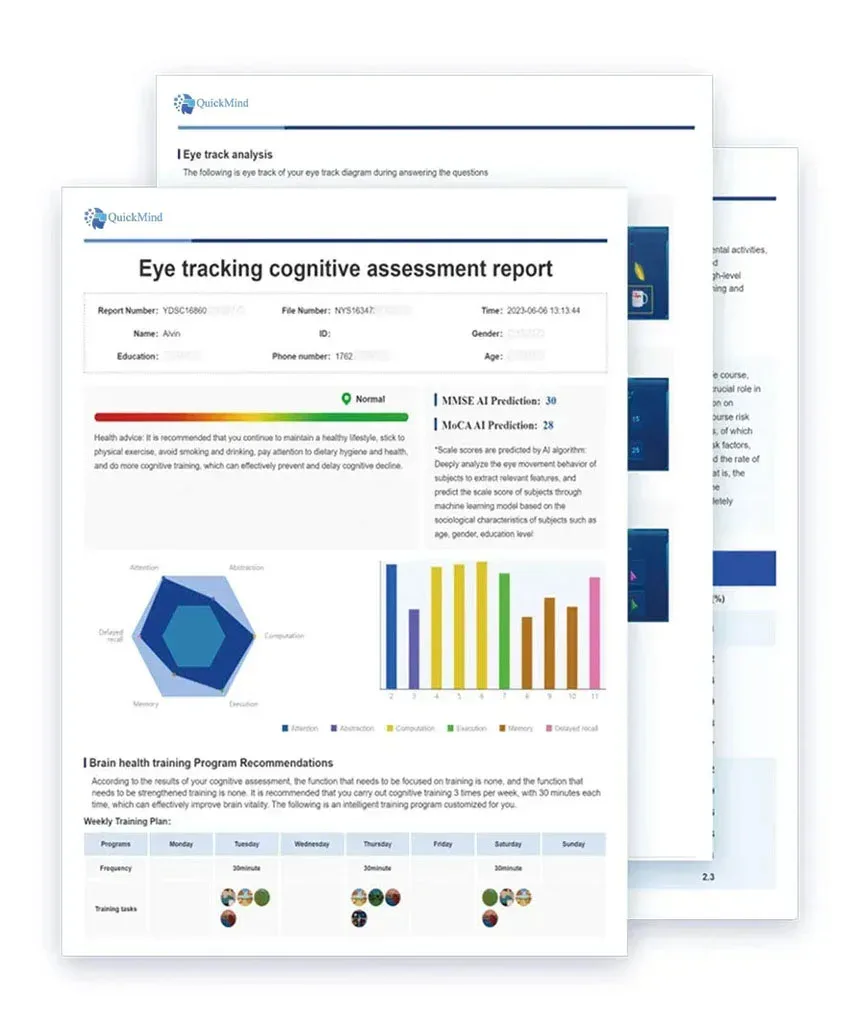
Advancing assessments proposes that virtual simulation strategy can significantly enhance the well-being of people diagnosed with age-related cognitive diseases. By taking them to tranquil places, VR offers a original avenue for thought encouragement, sentimental adjustment, and social interaction. Diverse analyses have reported that VR therapy can lessen uneasiness, unease, and despair in dementia patients while also elevating their recall, heedfulness, and expressive competencies.
- VR empowers clients with dementia to rehash fond remembrances through collaborative impressions.
- Also, it can offer a reliable and facilitative space for community involvement, building a realization of bond and membership.
- Investigators believe that VR therapy has the possibility to reshape dementia assistance by delivering new and novel avenues to address the complex issues faced by persons struggling against this ailment.
Innovative Tech Treatments for Alzheimer's
Increasing software-based approaches are proving useful in the domain of brain function boosting for individuals dealing with Alzheimer's dementia. These systems utilize technical resources to energize brain capability and possibly curtail the spread of the disease. Fun-packed activities, personalized evaluation, and neuropsychological training are some instances of processes being investigated in this emerging discipline. While research are underway, digital therapeutics present a substitute channel for augmenting the experiences of those managing neurodegenerative Alzheimer type.Navigating Reality Through Virtual Landscapes: A Novel Approach to Alzheimer's Treatment
Touching subjects battling cognitive Alzheimer's ailment, the gradual decline of remembrance and mental skills can greatly weaken their facility to connect with the community. This harmful syndrome often causes in isolation, confusion, and a diminished ego recognition. Up-to-date refinements in virtual reality technology unveil a groundbreaking chance to counteract these challenges by developing immersive atmospheres that can trigger the brain and revive cognitive function.
Computer-generated surroundings created specifically for persons with Alzheimer's can send them in comforting environments, such as their former home or a favorite park, invoking positive memories and alleviating anxiety. Through interactive exercises, these virtual scapes can also test cognitive abilities like recall, vigilance, and solution finding.
The advantages of virtual reality in Alzheimer's therapy are manifold. Early evaluations have established promising results, with individuals demonstrating improvements in cognitive skills, mood, and overall quality of life. As this system continues, it holds the key to modifying the way we approach Alzheimer's disease, offering a new pathway for therapy and motivation.
VR Reminiscence Therapy for Alzheimer's Patients
Reminiscence therapy is a commonly used technique used to improve cognitive function and psychological wellness in individuals with Alzheimer's disease. This long-standing form of therapy involves prompting patients to retrieve past experiences, often through storytelling. However, a novel approach is emerging: VR-mediated reminiscence therapy.
This immersive technique utilizes virtual reality headsets to shift patients in realistic environments that trigger memories from their past. By going through these artificial surroundings, individuals with Alzheimer's can associate with their past in a valuable way.
Can VR Help Fight Dementia? Exploring the Impact on Memory and Cognitive Function
Virtual reality (VR) is emerging as a aspiring method in the fight against dementia, granting revolutionary ways to boost memory and cognition. By creating immersive environments, VR can help individuals with dementia recall memories, participate in meaningful activities, and develop cognitive powers. Studies have shown that VR interventions can lead to noticeable improvements in memory recall, attention, and positional awareness. Moreover, VR provides a protected and beneficial space for individuals with dementia to engage, reducing feelings of isolation and unease.
- In addition, VR can be adjusted to individual needs and preferences, permitting expanded levels of engagement.
- Even with the prospects of VR, more research is needed to fully understand its long-term impact in dementia care.
Bringing Back Memories, Strengthening Ties: VR Effects on Alzheimer's Social Life
Augmented digital experiences is emerging as a revolutionary technology in the domain of Alzheimer syndrome. By designing involving and collaborative spaces, VR has the power to encourage memories, strengthen social interaction, and improve the overall quality of life for participants struggling with Alzheimer's. One of Cognitive Rehabilitation the most remarkable aspects of VR is its ability to transfer users to familiar places and moments from their past. Whether it's a stroll in a childhood home or a representation of a beloved holiday, these virtual journeys can stimulate happy memories and improve cognitive performance. Furthermore, VR can assist social interaction by coupling individuals with others who share similar pastimes. This can be particularly constructive for people with Alzheimer's who may struggle with traditional social engagement. By developing a safe and absorbing virtual space, VR can minimize feelings of isolation and loneliness, which are common among individuals affected by Alzheimer's. Overall, VR holds immense prospect for overhauling the lives of individuals with Alzheimer's by restoring memories, recovering connections, and boosting their quality of life. As technology persists in mature, we can expect even more revolutionary applications of VR in the field of dementia care.Leveraging Cognitive Training: Exploiting VR as Cognitive Aid in Alzheimer's
Artificial reality platforms is rapidly emerging as a disruptive tool in the realm of cognitive training, particularly for patients managing Alzheimer's disease. By immersing patients in interactive and engaging virtual environments, VR-based interventions can augment cognitive functions such as memory, attention, and problem-solving. These games routinely incorporate elements of storytelling, exploration, and social interaction, making the training process deeply involving. Studies have shown that VR-based cognitive training can lead to marked improvements in cognitive performance, likely delaying the progression of Alzheimer's symptoms. Moreover, VR provides a safe and controlled environment for patients to practice new skills and build their confidence.
- Game-enhanced procedures in VR training can make it very enjoyable and involving for participants with neurological deficits.
- VR simulations can offer believable scenarios that provoke and motivate cognitive functions.
- Personalized VR experiences can cater to particular desires and modalities.
A Simulated Second Chance: Exploring the Benefits of VR Environments for Individuals with Dementia
Mesmerizing digital environments offer a original and optimistic avenue for people affected by dementia. These tools can generate familiar environments, allowing those affected by cognitive decline to relive cherished memories and enhance a sense of well-being. By alleviating the effects of dementia, VR scenarios have the power to boost quality of life for both individuals and their caregivers.
- Assessments indicate that VR treatments can significantly impact cognitive function, behavioral well-being, and even physical abilities in individuals with dementia.
- Moreover, VR creates a safe and supportive environment for experience, reducing the risk of damage.
- Moreover, VR can facilitate social associations by allowing individuals with dementia to communicate in simulated activities with others.
Utilizing Virtual Reality for Early Alzheimer's Identification and Management
cognitive Alzheimer's illness emerges a multifaceted conundrum, often remaining in its early stages. Nevertheless, virtual reality (VR) is showing promise as a trailblazing tool for initial identification. Through immersive virtual worlds, VR can test cognitive capacity in ways that traditional methods are limited to. This possibility allows for speedy involvement strategies, potentially reducing disease progression and elevating the quality of life for individuals with Alzheimer's.
- VR cognitive tests measure recall, alertness, and positional skills in safe and regulated spaces.
- Individualized VR environments encourage client participation in brain-boosting activities.
- VR worlds offer empathetic environments for interaction among those affected by Alzheimer's.
Bridging the Gap: Virtual Reality for Communication and Participation in Dementia Care
{In the realm of dementia care, innovative technologies are emerging to boost the lives of individuals living with this challenging condition. Virtual reality (VR) is one such platform that holds immense capability for fostering communication and interaction improvements in dementia via VR. By fabricating interactive simulated worlds, VR can animate cognitive function, reduce behavioral issues, and ultimately improve the overall well-being of users in dementia care.
VR experiences focused on dementia patient engagement can range from recall therapy sessions that fade patients back into earlier life scenes, to interactive games that promote social interaction and cognitive activation. Furthermore, VR has the capability to connect persons managing dementia with social groups, regardless of physical isolation, fostering a sense of togetherness.
- VR can facilitate in reducing agitation and anxiety by providing a calming and captivating environment.
- Clinical trials have shown that VR interventions can lead to improvements in cognitive function, mood, and social interaction in clients experiencing cognitive decline.
- As technology moves forward with evolve, we can expect even more innovative and {effective|beneficial|helpful|powerful|impactful|successful|productive|efficient
